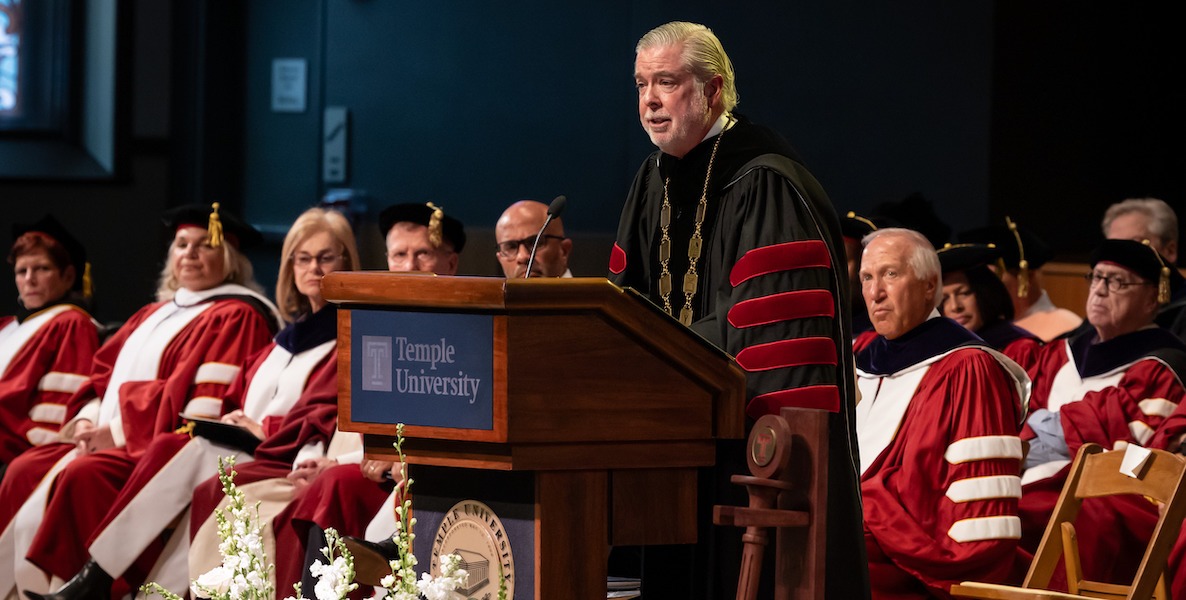We’ve seen a lot more ghosts of Neville Chamberlain lately than, say, apparitions of Winston Churchill. These are stark moral times; appeasers on one side, warriors on the other. In the Academy, endowment-rich institutions like Columbia and Harvard universities have seemed to cower before MAGA-world targeting, as if you can deal-cut your way out of culture war. Indeed, despite Columbia’s acquiescence, The Wall Street Journal reported yesterday that Trump seeks a de facto federal takeover of the university.
Listen to the audio edition of this story here:
Signal weakness, and you invite such federal overreach — and this applies beyond the walls of academe. Senators who dare not hold bipartisan town halls actually bolster illiberalism. Ditto for the high-powered law firms kowtowing to Oval Office bullying rather than falling back upon their strength: the rule of law.
That’s why it was so refreshing last week to witness a local leader rousingly casting his lot against appeasement. John Fry’s address to the Temple University community upon his Investiture as the school’s 15th president in its 141-year history doubled down on Enlightenment values — and just may be modeling a way forward for would-be leaders in the age of autocracy. It is possible, after all, to marry high-minded principles with testicular fortitude.
I’d seen Fry two weeks prior to his speech, and he was agonizing over its writing. He realized the import of the moment. Institutions, long fraying, are now under attack. Rather than play rope-a-dope, as so many finger-to-the-wind leaders have done, Fry came out swinging with a call to arms. Fry posited, quoting from a New York Times editorial, academic leaders can “help themselves and the country by emerging from their defensive crouches and making a forthright case for inquiry, research, science and knowledge.”
“It is impossible to exaggerate the dire consequences of powering down our country’s mighty university-based research engine. If we do nothing, imagine the countless discoveries, the creative works and the lifesaving breakthroughs that will never see the light of day.” — John Fry
Time and again, he dared use the “D” word — diversity — and heralded Temple as Exhibit A in its transformative powers, noting that an astonishing 40 percent of the school’s most recent class consists of first generation college students. “Through liberal arts, we celebrate and nourish the life of the mind,” Fry said, echoing Allan Bloom’s definition of education as the movement of darkness into light. Temple, Fry held, is “proudly urban … [We] build economic, social and health equity urban neighborhoods everywhere, starting here in North Philly.”
If the prevaricator-in-chief was listening, Fry didn’t sugarcoat. “Let’s not kid ourselves,” he said. “American higher education has never faced headwinds like these. The future of the 80-year partnership between the federal government and higher education, which has made the U.S. the world leader in scientific research and discovery and benefited all Americans, now hangs in the balance. It is impossible to exaggerate the dire consequences of powering down our country’s mighty university-based research engine. If we do nothing, imagine the countless discoveries, the creative works and the lifesaving breakthroughs that will never see the light of day.”
Standing up for values that matter
Here and there, other university leaders have also resisted the purveyors of know-nothingness. In Iowa, Drake University’s president has forthrightly opposed a law taking away the civil rights of trans and nonbinary Iowans. Wesleyan President Michael Roth has called out the cowardice of his brethren, saying that the Trump administration’s arrest, absent due process, of Columbia protestor Mahmoud Khalil “should terrify every college president.” But few have had as much on the line as Fry, who heads an urban public research institution in the heart of deep blue Philly.
In his speech, Fry explicitly stood for timeworn values like academic freedom, civility, the sustaining power of intellectual inquiry and the transformative power of difference. Afterwards, much of the talk centered around Fry’s announcement that he’d secured the largest individual donation in the school’s history — $27 million from philanthropists Sidney and Caroline Kimmel — and that he’d soon be announcing an ambitious fundraising campaign.
But just as inspiring is his vision of Temple as a modern-day type of Land Grant University, which also connects to Fry’s commitment to centering equal opportunity. The original Land Grant legislation was signed into law by none other than Abraham Lincoln in 1862, funding higher education in the states that would focus on practical academic pursuits in agriculture, science and engineering; ultimately, it gave rise to state colleges and the creation of Historically Black Colleges and Universities.
To Fry’s way of thinking, Temple fits the historic Land Grant model by spurring inclusive growth and providing opportunity. Central is Fry’s vision of building Temple into a hub of innovation. “Temple will be seen as one of the country’s most innovative and inclusive comprehensive public research universities, with far reaching impact,” he said.
And he didn’t stop there, painting a vision for the city as a whole, as well:
“The Broad Street Innovation District will be developed in the spirit of the great innovation districts in University City and Navy Yard, and hopefully one day all three will be connected into one great Philadelphia research and innovation triangle,” he said, and you could almost feel the audience’s gasp of recognition: Here was a vision.
Unafraid to lead in a time of crisis
This being Philly, there are doubts out there about what Fry’s up to. Progressives worry he’ll gentrify North Philly. The establishment frets that all his talk about DEI will put a target on the city’s back. But what we have here is a leader in a time of crisis unafraid to lead, one who reminds us that, in the words of surgeon and inventor Robert Jarvik, “Leaders are visionaries with a poorly developed sense of fear and no concept of the odds against them.”
As Fry spoke, you detected no equivocation, and you realized just how rare that is nowadays. While others catastrophize, Fry plans. In that and many other ways, Fry is staying true to the roadmap laid out by a mutual hero of ours, former Yale University President and Major League Baseball Commissioner Bart Giamatti. (You might know Giamatti for having sired an award-winning actor; I came to him through baseball. Every opening day, I re-read his collection of writings, A Great and Glorious Game.)
Once, Fry pointed me to a line in Giamatti’s 1989 New York Times obituary: “My goal has been to encourage jointness, to push people to think of affiliations rather than to operate as solo entrepreneurs.” Giamatti was an Ivy League professor of Renaissance literature who was a surprising choice to be Yale’s president at all of 39 years old in 1979; Fry is no academic, but he saw Giamatti take on Yale’s tradition of building “leaders” by proclaiming his university was really in the business of producing citizens, and he became enamored.
This rousing Giamatti defense of pluralism could just as easily have come from Fry’s speech last week:
Pluralism is not relativism. It does not mean the denial of absolutes or the absence of standards. Pluralism is not code for anything. It signals the recognition that people of different ethnic groups and races and adherents of various religious and political and personal beliefs have a right to coexist as equals under the law and have an obligation to forge the freedoms they enjoy into a coherent, civilized and vigilant whole … If pluralism as a concept denies anything, it denies the hegemony of the homogeneous, the rule by a single, overmastering sensibility which would exclude all those who are different from the general benefits of citizenship.
The general benefits of citizenship. Like Giamatti, great leaders stay focused on what’s possible to build, rather than just wallowing in the challenges of today. Perhaps that’s why Fry chose to conclude his speech by calling upon his 34-year-old daughter, Mia Fry, to read a poem, A House Called Tomorrow, by Alberto Rios, which includes the lines:
Look back only for as long as you must /
Then go forward into the history you will make.
Clarification: An earlier version of this story attributed a quote to John Fry that he failed to note was taken from a New York Times editorial.
![]() MORE ON HIGHER EDUCATION FROM THE CITIZEN
MORE ON HIGHER EDUCATION FROM THE CITIZEN






